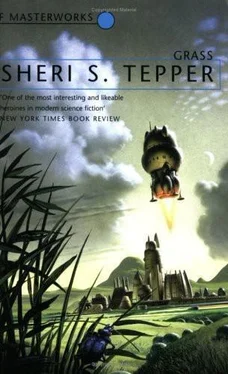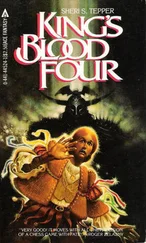Sheri Tepper - Grass
Здесь есть возможность читать онлайн «Sheri Tepper - Grass» весь текст электронной книги совершенно бесплатно (целиком полную версию без сокращений). В некоторых случаях можно слушать аудио, скачать через торрент в формате fb2 и присутствует краткое содержание. Город: London, Год выпуска: 2002, ISBN: 2002, Издательство: Gollancz, Жанр: Фантастика и фэнтези, на английском языке. Описание произведения, (предисловие) а так же отзывы посетителей доступны на портале библиотеки ЛибКат.
- Название:Grass
- Автор:
- Издательство:Gollancz
- Жанр:
- Год:2002
- Город:London
- ISBN:9781857987980
- Рейтинг книги:4 / 5. Голосов: 1
-
Избранное:Добавить в избранное
- Отзывы:
-
Ваша оценка:
- 80
- 1
- 2
- 3
- 4
- 5
Grass: краткое содержание, описание и аннотация
Предлагаем к чтению аннотацию, описание, краткое содержание или предисловие (зависит от того, что написал сам автор книги «Grass»). Если вы не нашли необходимую информацию о книге — напишите в комментариях, мы постараемся отыскать её.
Grass — читать онлайн бесплатно полную книгу (весь текст) целиком
Ниже представлен текст книги, разбитый по страницам. Система сохранения места последней прочитанной страницы, позволяет с удобством читать онлайн бесплатно книгу «Grass», без необходимости каждый раз заново искать на чём Вы остановились. Поставьте закладку, и сможете в любой момент перейти на страницу, на которой закончили чтение.
Интервал:
Закладка:
No one was guarding the bottom of the ladder he had climbed. The rooftop was empty. The fog had sunk almost to the level of the roof, and the door stood open with empty stairs below. From high above still came voices crying, “Here, here,” and the ladder still trembled with the force of the bodies rushing to and fro. He went out silently, down the stairs and through the vacant hall, out into the alleyway and back to his cell in the new dormitory, which was still only partially finished and almost uninhabited. As he entered the dormitory, he heard a dwindling cry, as of someone falling forever from a high place.
Once inside his cell he crawled under his cot and lay there, almost without breathing, tight against the wall. Twice in the night his door opened and a light was thrust inside.
Before dawn he rose and climbed back onto the tower, moving through gray dusk to the bridge where his robe was caught, with the rope girdle still dangling below. A sleeve of the robe had come loose and wound itself around the foot rope of the bridge, only enough to prevent the bundle falling, not enough that anyone had noticed it. Rillibee retrieved his robe and put it on, then sat on a high crossbrace for a long time, looking out over the Friary and the surrounding prairie.
In his head the parrot said, “Let me die.”
“I planned to,” he replied. “This morning.”
He put it off a little. He had planned to die this morning, but it was interesting upon the heights. The grass rippled below like an unending sea, stretching on every side to a limitless horizon. Things moved in the grass. Great beasts with barbed necks paraded on the ridge: Hippae. Torso-sized white crawlers struggled among the grass roots: peepers. Far to the south a line of great grazers moved slowly toward the east. He stared at them all, at the birds moving in clouds across the grasses, at the ripples here and there betokening mysterious movements by creatures he could not see. He wished there were trees. If there had only been trees… Still, the warm light shone on him like a benison, like a promise of something good to come.
By the time the sun rose, he was hungry enough to climb down and go to breakfast.
He was interrupted twice while he ate.
Once by Highbones, who strolled down the long line of tables to hiss at him, “Nobody makes a fool out of me and gets away with it, Lourai. Watch your back, because I’m coming to get you.”
Once by a man who called himself Ropeknots, accompanied by two others who seemed to be watching Ropeknots more than they watched Rillibee. Ropeknots had an angry, frustrated look as he said, “Topclinger got hisself killed last night, peeper. Some of us was his friends and we figure you must’ve knocked him off his perch tryin’ to get down.”
“I went up,” Rillibee explained, not looking at Ropeknots — who was livid with resentment and obviously unable to listen — but at the other two. “I hid in the fog and then when everyone went past, I came down the same ladder again. I didn’t knock anybody off anything, and by your own rules I’m not a peeper anymore.”
The calmer two of the delegation exchanged glances. Ropeknots growled, “I was guarding the door. You didn’t get past me. You killed Topclinger, then you got down somewhere else.”
“I went down through the same door. There was no guard there,” Rillibee said, tired of it all. “There was no one there at all.”
“I was there,” the other claimed with an ugly flush on his face and a sidelong glare at his companions. “Highbones told me to stay there and guard the door and I did.”
He turned and went away, leaving Rillibee staring after. After a moment, his two companions followed him. Rillibee wondered if the lie had been as patent to them as it was to him. The man had been told to keep watch, but he had left his post. Afterward, he had denied it. The denial suited Highbones’ purpose, too, for it served to throw suspicion for Topclinger’s death upon Rillibee. If anyone had killed Topclinger, it had been Highbones himself.
So, a faithless guard and a treacherous pack leader. Fine enemies to have. Rillibee sighed, wishing he had thrown himself off the spur when he’d had the chance last night. Or jumped off at dawn, as he’d planned to do.
He was considering climbing back up the tower for that purpose when he was interrupted again. This time it was half a dozen young Brothers who rubbed his head and laughed and said he had done a good job of losing them and named him Willy Climb on the spot because he’d climbed better than any other peeper of their generation. They loved him because he had confounded Highbones, whom they disliked, and because he had amused them. He became one of them in that instant, a leader of them, with several promising to watch his back for him and protect him from Ropeknots because everyone knew he was a shit and from Highbones, too, who yelled at other people for breaking the rules but always broke them himself.
Their easy friendship was enough to make Rillibee stop thinking about dying for a while. In the company of these newfound companions he climbed to the heights each evening in the dusk hours to sit on a brace and chant his own name while the others played tag across the bridges. He was aware of no distractions except the great night moths that blundered into him with their squishy bodies and the peepers that raised their hymns from the grass roots. Each sundown he ceased being Brother Lourai and became Rillibee Chime once again. As night came down he sat in cloudy silence, remembering his people and his place, and chanted, over and over again, Rillibee Chime, Songbird Chime, Joshua Chime, Miriam Chime. When his friends called him Willy Climb, he answered to that name, too. He was Willy Climb among the pack and ruck, becoming, so he thought to himself, multiple. Rillibee, Lourai, Willy. As though he had been folded and trimmed, like paper dolls, a chain of him extending from the planet of his birth to these cloud-wrapped steeples, where he would die, pretty soon, when he grew bored and depressed once more.
In the offices of Jhamlees Zoe, head of the Office of Security and Acceptable Doctrine, the man responsible for the affairs of the Friary was undoing, for the third or fourth time, a packet which had arrived a considerable time ago. Inside was a wad of printing beginning, as did all communications from the Hierarch — or even putatively from the Hierarch — “Dear Brother in Sanctity.” And so on and so on, wah, wah, wah. Pages of it, spewed out of a cleric-all, dull as porridge and meaningless as peeper song. The real meat was in the middle of this manuscript, two pages inserted there which were written in a familiar hand:
“My dear old friend Nods. By the time you read this, I will be the new Hierarch of Sanctity.” Which was interesting. Cory had always said he would be Hierarch someday. When they had been in seminary together as boys, Cory had said it; even then, Jhamlees Zoe nodded. It just went to prove how ruthless Cory really was.
He read further:
The Hierarch past, one Carlos Yrarier, has for some esoteric reason picked his nephew Roderigo to go to Grass and find out whether there is plague or a cure for plague on your world. Pay attention, old friend. Though it is still policy to deny it, there is plague here, as there is everywhere else.
If Yrarier finds no help upon Grass, we may have to depend upon the machines to resurrect us after the danger has passed. Some of us, at least Thee and me, old friend. As you know, it has never been Sanctity’s intention to resurrect many! Why bring all that fodder to life again when it did so little the first time around?
Jhamlees nodded once again. That was sound doctrine, though not doctrine ever shared with the masses. If the machines ever woke them into some new world, it would be a very selective waking, Jhamlees’ cell-sample was in machine “A,” along with a few hundred thousand others. The other billions could be roused if needed, but such need was doubtful.
Читать дальшеИнтервал:
Закладка:
Похожие книги на «Grass»
Представляем Вашему вниманию похожие книги на «Grass» списком для выбора. Мы отобрали схожую по названию и смыслу литературу в надежде предоставить читателям больше вариантов отыскать новые, интересные, ещё непрочитанные произведения.
Обсуждение, отзывы о книге «Grass» и просто собственные мнения читателей. Оставьте ваши комментарии, напишите, что Вы думаете о произведении, его смысле или главных героях. Укажите что конкретно понравилось, а что нет, и почему Вы так считаете.












